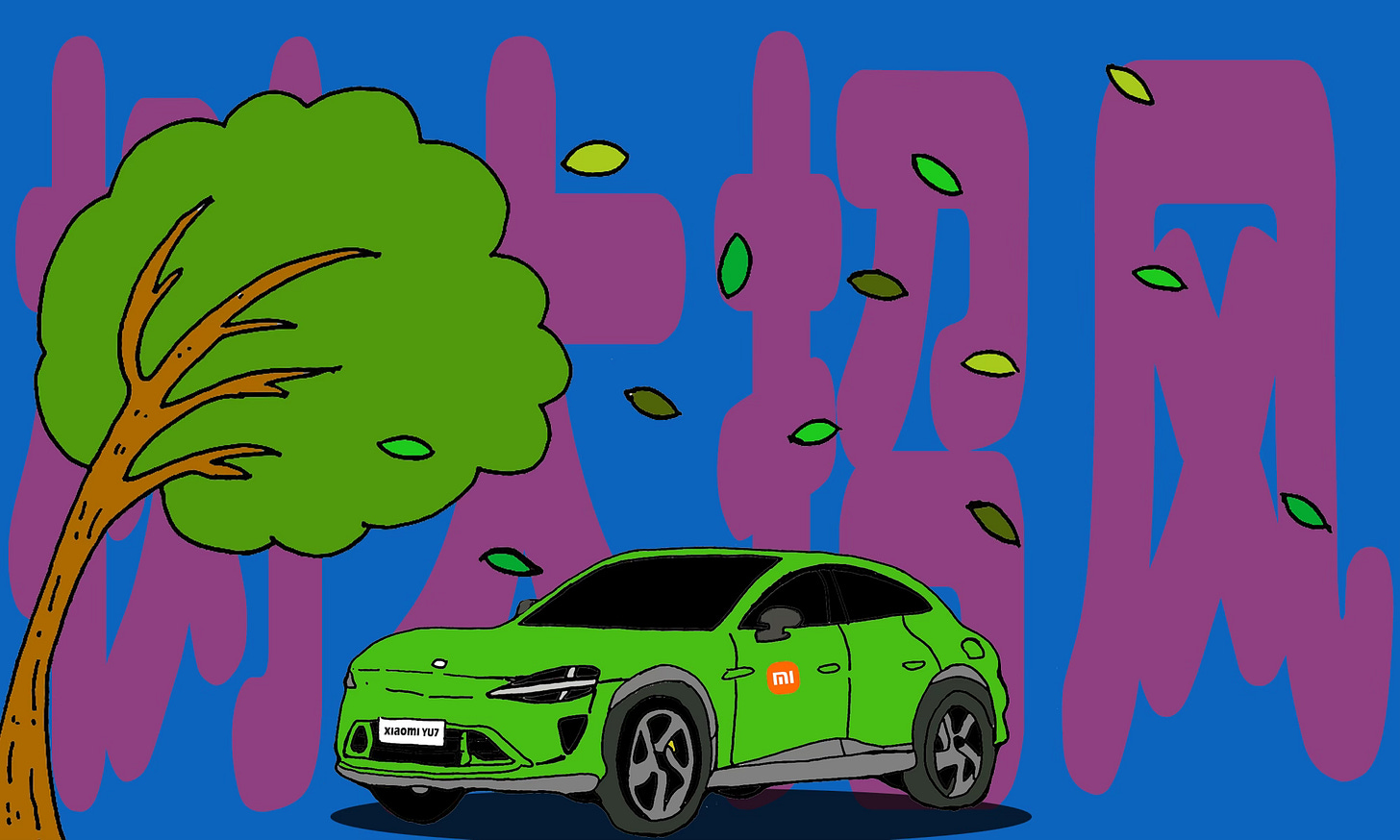"The tallest tree catches the strongest wind" — Phrase of the Week
Xiaomi can't get away with its old marketing tactics any more

Our phrase of the week is: “the tallest tree catches the strongest wind” (树大招风 shù dà zhāo fēng)
Context
Lei Jun (雷军), founder of tech and EV giant Xiaomi (小米), is facing online criticism over misleading marketing claims.
Lei proudly announced that Xiaomi’s YU7 EV had topped the charts in a winter range test by Autohome (汽车之家), China’s largest online automotive platform:
“Xiaomi YU7 participated in Autohome’s winter test and ranked first in EV range!”
小米YU7参加汽车之家冬测,冬季续航测试第一!
But sharp-eyed netizens quickly spotted the discrepancy.
The actual test report used the phrase “test in near-winter conditions” (准冬测), not “winter test” (冬季测试). That single-character difference matters enormously: “near-winter testing” (准冬季) is conducted at around 10°C, while industry-standard “winter testing” (冬季测试) should be at -10°C or lower.
By conflating the two, Xiaomi claimed winter credentials without facing genuine winter conditions.
In China’s increasingly sensitive consumer environment, such tactics are becoming unacceptable. While these practices exist industry-wide and aren’t unique to Xiaomi, the company has become a bigger target for public criticism as it’s grown more prominent:
Xiaomi’s swift rise has inevitably drawn public backlash, just like how the tallest tree catches the strongest wind.
树大招风“的小米还是成了部分网友的”情绪宣泄口”。
“shù dà zhāo fēng” de Xiǎomǐ háishì chéng le bùfèn wǎngyǒu de “qíngxù xuānxiè kǒu”.
And with that, we have our Sinica Phrase of the Week.
What it means
“The tallest tree catches the strongest wind” (树大招风 shù dà zhāo fēng) is a four-character idiom which literally translates as “tree” (树 shù), “big” (大 dà), “attracts” (招 zhāo), “wind” (风 fēng).
It describes how when a person or organization becomes prominent, successful, or famous, they naturally attract more attention — and with that attention comes scrutiny, jealousy, and criticism.
The earliest written record of the idiom appears in Chapter 33 of Journey to the West (西游记), one of China’s “four great classical novels” (四大名著). The novel was published around 1592 during the Ming Dynasty, attributed to Wu Cheng’en (吴承恩), though authorship is debated.
The original excerpt reads:
“A tall tree catches the wind, and the wind shakes the tree.”
树大招风风撼树
shù dà zhāo fēng fēng hàn shù
In this chapter, the monk Tang Sanzang (唐三藏) and his disciples encounter the demon king. The phrase appears in a poem describing how prominent figures naturally attract trouble and enemies such as the demon king — fitting the theme of the monk’s dangerous journey where his fame as a holy man makes him a target for demons.
Back to Xiaomi: as the company has grown from scrappy startup to tech giant worth hundreds of billions of yuan, it has inevitably become a “tall tree.” So every marketing misstep, every product flaw, every questionable claim now gets amplified and scrutinized by millions of people online and in the media.
Lei Jun’s “winter conditions” claim is a perfect example. What might have been overlooked when Xiaomi was smaller has now become a full-blown PR crisis precisely because of the company’s prominence. The bigger it’s become, the more scrutiny it faces.
In English, this might be translated as “tall poppy syndrome,” “success breeds envy,” or “fame comes at a price.”
But we prefer the direct Chinese translation, “the tallest tree catches the strongest wind”, which captures the imagery perfectly.
Andrew Methven is the author of RealTime Mandarin, a resource which helps you bridge the gap to real-world fluency in Mandarin, stay informed about China, and communicate with confidence—all through weekly immersion in real news. Subscribe for free here.
Read more about how this story is being discussed in the Chinese media in this week’s RealTime Mandarin.




Since going from the Forbes Rich List to jail is practically an escalator in China, being 低调 (low key) is obviously the smart way for business people to be. That bet that Lei Jun put on with Gree CEO Dong Mingzhu always got me thinking that one of them would end up as the Bo Xilai of the business world